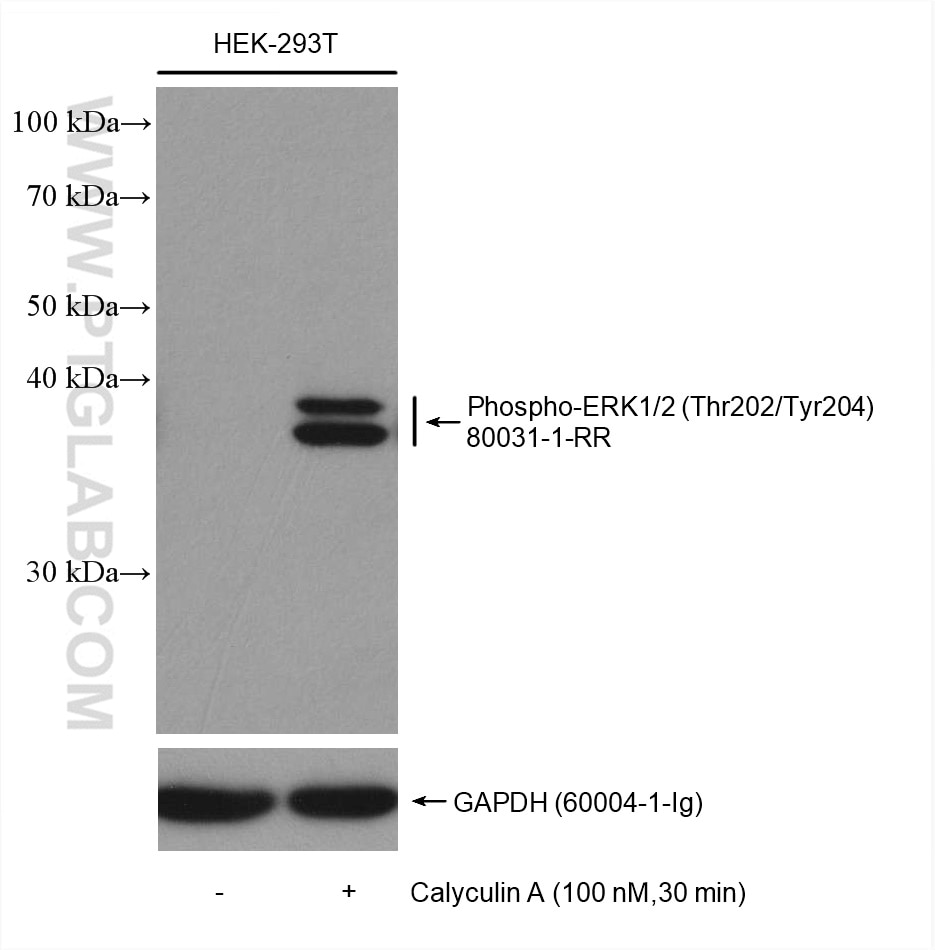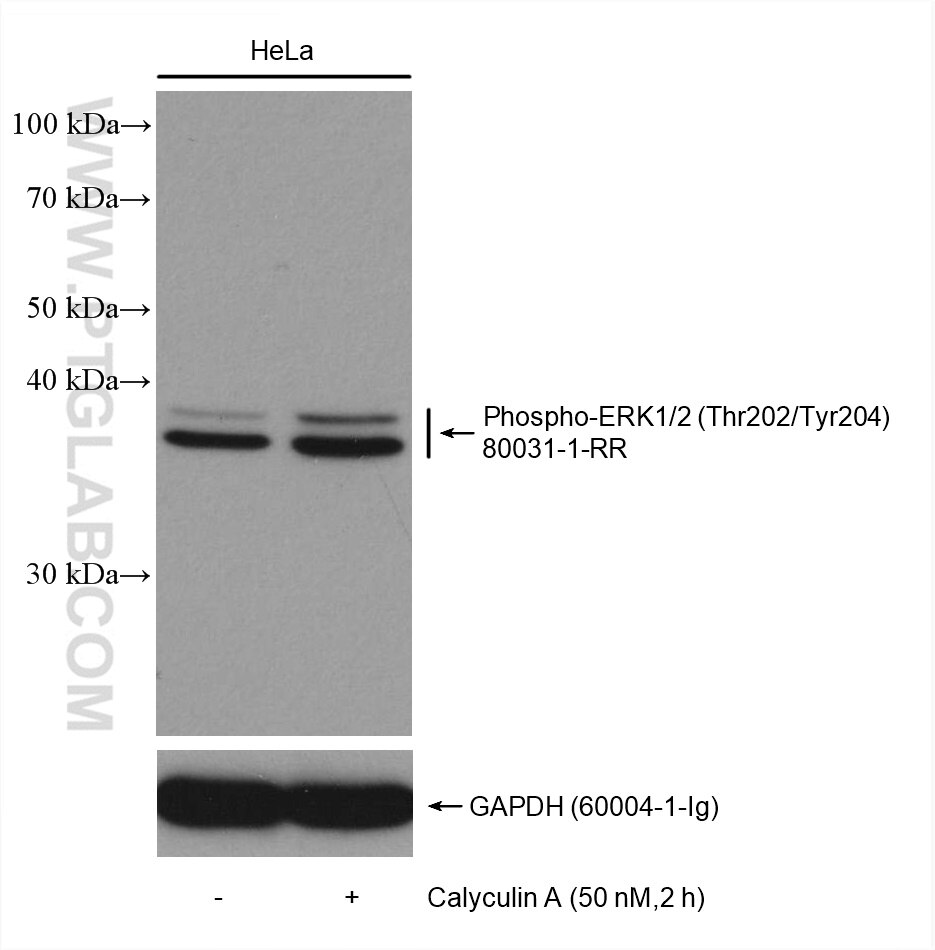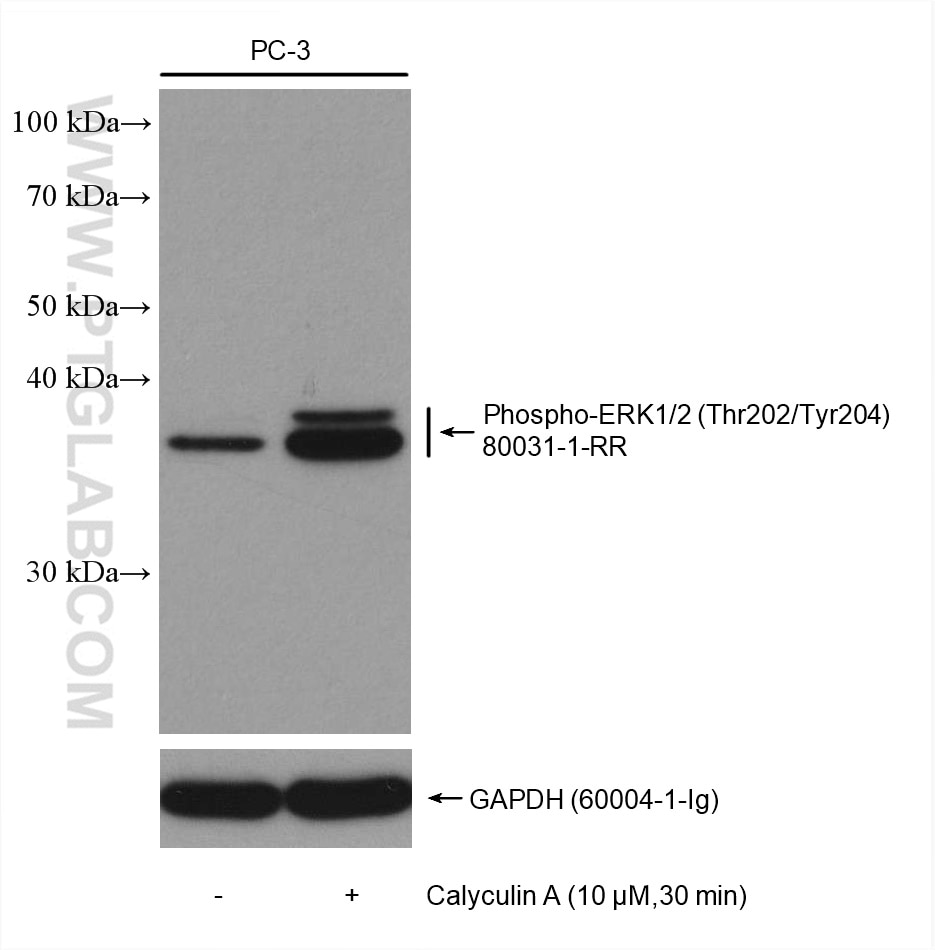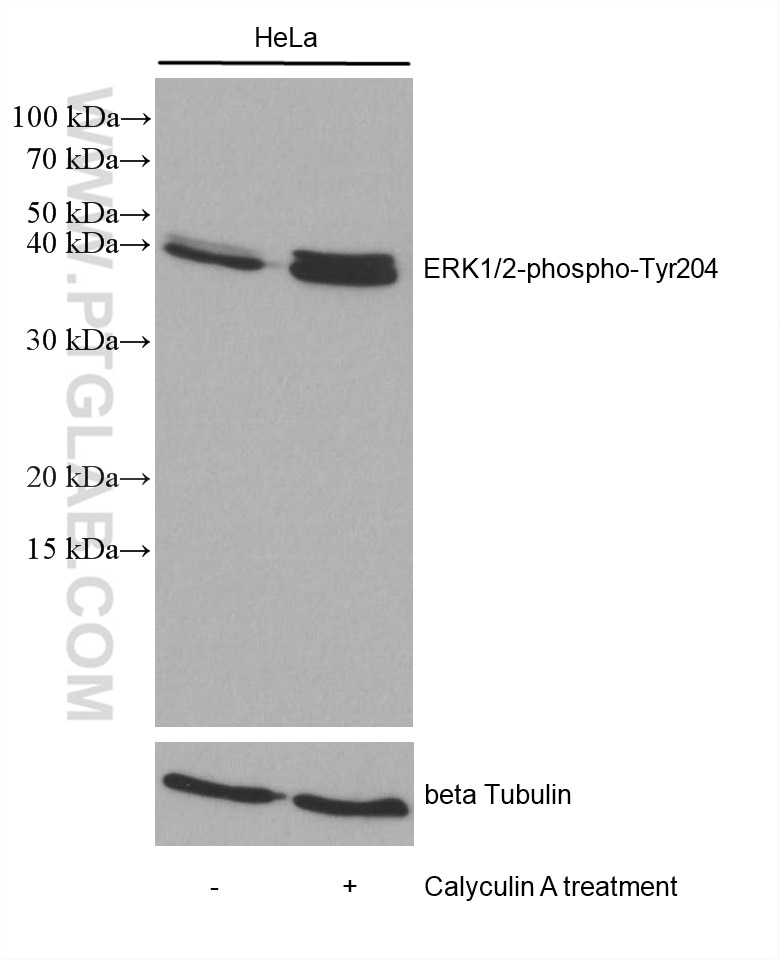Anticorps Recombinant de lapin anti-Phospho-ERK1/2 (Thr202/Tyr204)
Phospho-ERK1/2 (Thr202/Tyr204) Recombinant Antibody for WB, ELISA
Hôte / Isotype
Lapin / IgG
Réactivité testée
Humain et plus (2)
Applications
WB, ELISA
Conjugaison
Non conjugué
CloneNo.
8D12
N° de cat : 80031-1-RR
Synonymes
Galerie de données de validation
Applications testées
| Résultats positifs en WB | cellules HEK-293T, cellules HeLa, cellules HeLa traitées à la calyculine A, cellules PC-3, cellules PC-3 traitées à la calyculine A |
Dilution recommandée
| Application | Dilution |
|---|---|
| Western Blot (WB) | WB : 1:2000-1:10000 |
| It is recommended that this reagent should be titrated in each testing system to obtain optimal results. | |
| Sample-dependent, check data in validation data gallery | |
Applications publiées
| WB | See 19 publications below |
Informations sur le produit
80031-1-RR cible Phospho-ERK1/2 (Thr202/Tyr204) dans les applications de WB, ELISA et montre une réactivité avec des échantillons Humain
| Réactivité | Humain |
| Réactivité citée | rat, Humain, souris |
| Hôte / Isotype | Lapin / IgG |
| Clonalité | Recombinant |
| Type | Anticorps |
| Immunogène | Peptide |
| Nom complet | mitogen-activated protein kinase 3 |
| Masse moléculaire calculée | 38-43 kDa |
| Poids moléculaire observé | 38-40 kDa |
| Numéro d’acquisition GenBank | NM_002746 |
| Symbole du gène | MAPK3 |
| Identification du gène (NCBI) | 5595 |
| Conjugaison | Non conjugué |
| Forme | Liquide |
| Méthode de purification | Purification par protéine A |
| Tampon de stockage | PBS avec azoture de sodium à 0,02 % et glycérol à 50 % pH 7,3 |
| Conditions de stockage | Stocker à -20°C. Stable pendant un an après l'expédition. L'aliquotage n'est pas nécessaire pour le stockage à -20oC Les 20ul contiennent 0,1% de BSA. |
Informations générales
Serine/threonine kinase which acts as an essential component of the MAP kinase signal transduction pathway. MAPK1/ERK2 and MAPK3/ERK1 are the 2 MAPKs which play an important role in the MAPK/ERK cascade. They participate also in a signaling cascade initiated by activated KIT and KITLG/SCF. Depending on the cellular context, the MAPK/ERK cascade mediates diverse biological functions such as cell growth, adhesion, survival and differentiation through the regulation of transcription, translation, cytoskeletal rearrangements. The MAPK/ERK cascade plays also a role in initiation and regulation of meiosis, mitosis, and postmitotic functions in differentiated cells by phosphorylating a number of transcription factors. MEK1 and MEK2 activate p44 and p42 through phosphorylation of activation loop residues Thr202/Tyr204 and Thr185/Tyr187, respectively. Several downstream targets of p44/42 have been identified, including p90RSK and the transcription factor Elk-1.
Protocole
| Product Specific Protocols | |
|---|---|
| WB protocol for Phospho-ERK1/2 (Thr202/Tyr204) antibody 80031-1-RR | Download protocol |
| Standard Protocols | |
|---|---|
| Click here to view our Standard Protocols |
Publications
| Species | Application | Title |
|---|---|---|
Br J Pharmacol Allicin ameliorates imiquimod-induced psoriasis-like skin inflammation via disturbing the interaction of keratinocytes with IL-17A | ||
Cell Death Dis USP4 promotes the proliferation, migration, and invasion of esophageal squamous cell carcinoma by targeting TAK1 | ||
Aging (Albany NY) METTL3 regulates hippocampal gene transcription via N6-methyladenosine methylation in sevoflurane-induced postoperative cognitive dysfunction mouse | ||
J Cell Physiol PKC-β/Alox5 axis activation promotes Bcr-Abl-independent TKI-resistance in chronic myeloid leukemia | ||
Front Oncol A Novel Small Molecular Antibody, HER2-Nanobody, Inhibits Tumor Proliferation in HER2-Positive Breast Cancer Cells In Vitro and In Vivo. | ||
J Cell Mol Med Sirtuin 3 deficiency aggravates angiotensin II-induced hypertensive cardiac injury by the impairment of lymphangiogenesis. |





